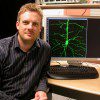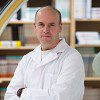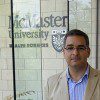
Neuroscientists at the Hotchkiss Brain Institute find key channel in prominent inhibitory response of the brain


Read his profile: Michael Gordon – 2015 CAN Young Investigator

“A big challenge in treating stroke is understanding how other health conditions affect recovery,” says Craig Brown, a neuroscientist in UVic’s Division of Medical Sciences “Many diseases increase the chances of having a stroke, and they also limit recovery. Diabetes is one of these diseases, affecting millions in Canada. Much like a five-card poker hand, the unique collection of health concerns a patient holds in their hand likely dictates how they should be treated.” Continue reading

A team of researchers at the IRCM led by Michel Cayouette, PhD, identified one of the genes responsible for producing a type of cell required for vision. The breakthrough, published in the scientific journal Neuron, could eventually help overcome obstacles associated with treatments to prevent blindness. Continue reading

Years ago, children were warned that smoking could stunt their growth, but now a major study by an international team including the Montreal Neurological Institute at McGill University and the University of Edinburgh shows new evidence that long-term smoking could cause thinning of the brain’s cortex. Continue reading

Brain cancer patients may live longer thanks to a new cancer-detection method developed by researchers at the Montreal Neurological Institute and Hospital – The Neuro, at McGill University and the MUHC, and Polytechnique Montréal. The collaborative team has created a powerful new intraoperative probe for detecting cancer cells. Continue reading

Canadian researchers have completed an international randomized controlled trial showing that a clot retrieval procedure, known as endovascular treatment (ET), can dramatically improve patient outcomes after an acute ischemic stroke. The study, led by researchers at the University of Calgary’s Hotchkiss Brain Institute (HBI), shows a dramatic improvement in outcomes and a reduction in deaths from stroke. The results of this study were published in the Feb. 11 online edition of the New England Journal of Medicine (NEJM).

Psychopathic violent offenders have abnormalities in the parts of the brain related to learning from punishment, according to an MRI study led by Sheilagh Hodgins and Nigel Blackwood. “One in five violent offenders is a psychopath. They have higher rates of recidivism and don’t benefit from rehabilitation programmes. Our research reveals why this is and can hopefully improve childhood interventions to prevent violence and behavioural therapies to reduce recidivism,” explained Professor Hodgins of the University of Montreal and Institut universitaire en santé mentale de Montréal. Continue reading

Researchers from McMaster’s Offord Centre for Child Studies have found that preschool children with autism spectrum disorder (ASD) differed from each other in symptom severity and adaptive functioning at the time of diagnosis and some of these differences appeared to increase by the age of six. Continue reading

Recent research into brain control of liver lipid production could cause break in obesity and diabetes treatment.
Ways of keeping the heart healthy has widened, with the discovery that the brain can help fight off hardening of the arteries.
Atherosclerosis—hardening and narrowing of the arteries—can be caused by fat build up that causes plaque deposits, and is one of the main causes of cardiovascular disease. Continue reading